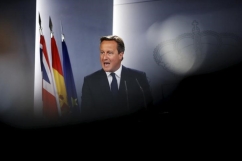A human rights group has launched legal action against the UK government over the recent drone strikes in Syria which killed two British citizens.
Rights Watch (UK) has said it will issue judicial review proceedings in the high court unless the government publishes the legal advice it received from attorney general, Jeremy Wright QC, to justify the attacks, the Guardian reports.
"There is insufficient information in the public domain...to know whether the drone strikes that killed three individuals in Syria, including two British citizens, were done lawfully," said Yasmine Ahmed, director of Rights Watch (UK).
"These strikes set a dangerous precedent for UK government activity. The UK government can now kill at will with no oversight."
Two British citizens who fought for ISIS, Reyaad Khan and Ruhul Amin, were deliberately killed in an RAF targeted drone strike, David Cameron said on Monday. A third Briton, Junaid Hussain, also fighting for ISIS was killed in a US operation acting alongside UK intelligence.
Questions over the legality of the government's decision were raised after the defence secretary, Michael Fallon, promised the government wouldn't hesitate to take similar action again against other terrorists involved in other plots.
The justification for the attack, which happened near the Syrian city of Raqqa on 21 August, has been criticised by lawyers for stretching the legal definition of what constitutes an imminent threat to a country and its permissible acts of self-defence.
A state has a guaranteed right to self-defence, according to article 51 of the UN charter, but the way in which that is interpreted differs. British case law establishes that force can be used only if a threat is imminent and pursuing peaceful alternatives is not an option. The response to the threat must be proportionate.
However, after 9/11, the US government has operated with a looser definition of what is imminent which does not require the clear evidence of an attack in the immediate future.
"The US took the definition of imminence and turned it completely on its head," Jennifer Gibson, a lawyer at the UK civil rights group told the Guardian. "Imminence was no longer imminent but rather sometime in the future and with no clear evidence required.
"The question for Cameron now is: which definition is he following? Has the UK also redefined imminence?"
The former director of public prosecutions and Liberal Democrat peer, Ken Macdonald, said he hoped Fallon's comments did not signify an adoption of US tactics but defended the principle of self-defence.
"If, however, we are talking about moving towards a US system which means targeting anyone who is a self-professed member of a terrorist organisation, then I'm against that. It would defeat the definition of an imminent attack.
"The worry is that this is being broadened out. What these people were concerned with was planning attacks on VE Day, yet they were not killed until several weeks after VE Day. That's a concern."
Downing Street and the attorney general's office refused to publish the advice given to the prime minister. It was contrary to the Cabinet Office manual to release the text of any legal advice, a No 10 spokesman said.
















